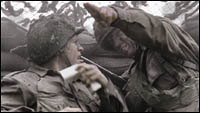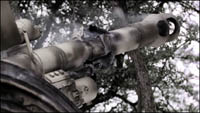Otherwise known as Murphy’s laws of Combat, most of which are derived from Murphy’s more general law: “Anything that can go wrong, will go wrong.” Soldiers often add to this what is called O’Neil’s Law: “Murphy was an optimist.”
War is, of course, a highly unstable and chaotic undertaking. Combat and preparation are beset on all sides by unanticipated problems, especially during the opening stages of combat, when all of the theoretical constructs, plans, and doctrines are put to the test. Infantrymen are a common victim of Murhpy’s Law, and have thus codified their general observations in a list of Murphy’s laws of Combat. Naturally, there are many variations of the list, but I’ll only be referencing a few rules because I think they’re a rather telling example of heuristics in use.
Most of the rules are concise and somewhat humorous (if it weren’t for the subject matter) bits of wisdom such as “Incoming fire has the right of way,” and though some are indeed factual, most are based on general observations or are meant to imply a heuristic. For instance:
Always keep in mind that your weapon was made by the lowest bidder.
This is, of course, a fact: most of the time, weapons are made by the lowest bidder. And yet, there is an unmistakable conclusion that one is supposed to reach when reading this rule: your weapon won’t always work the way it is supposed to. That is also true, but it is worth noting that one must still rely on their weapon. If a soldier refused to fight unless he had a perfect weapon, he would never fight! This is an example of a heuristic which one must be aware of, but which one must use with caution. Weapons must be used, after all.
Perfect plans aren’t
No plan survives the first few seconds of combat.
A Purple Heart just proves that you were smart enough to think of a plan, stupid enough to try it, and lucky enough to survive.
These laws refer to the difficulty in planning an action during the chaotic and unpredictable atmosphere of war. To go into battle without a plan is surely foolish, and yet, ironically, the plan rarely survives in tact (interestingly, these laws which indicate a failure of one heuristic, the necessity of planning, have become another: don’t blindly follow the plan, especially when events don’t conform to the plan). The ability to adapt and improvise is thus a treasured characteristic in a soldier.
I recently watched a few episodes of the excellent Band of Brothers series, and in one episode, a group of US soldiers assault a German artillery battery. Lieutenant Winters, the man planning the attack, instructs Sergeant�Lipton that he’ll need TNT the moment his group reaches the first gun (so they can blow it up).
Of course, it doesn’t quite go as planned, and Lipton is held up crossing the battlefield. Winters improvises, using what he has available (another soldier had some TNT, but no way to detonate it, so they used a German grenade they found in the nest). Once Lipton finally reaches Winters with the TNT, Winters simply points to the busted gun, illustrating the the plan has not survived.
  |
If it wasn’t war, the futility of Lipton’s actions would have been a comical moment. Instead it is somewhat infuriating. I don’t think his TNT was ever actually used, even though all 4 guns were taken out during the battle…
A couple of times above, I’ve said that something might be funny, if it wasn’t about war, which was a point I sort of made in my earlier post:
When you’re me, rooting for a sports team or betting modest amounts of money on a race, failure doesn’t mean much. In other situations, however, failure is not so benign. Yet, despite the repercussions, failure is still inevitable and necessary in these situations. In the case of war, for instance, this can be indeed difficult and heartbreaking, but no less necessary.
When planning a war, it is necessary to rely on heuristics because you may not have all the information you need or the information you have might not be as accurate as you think. Unfortunately, there is no real way around this. Soldiers are forced to make decisions without all the facts, and must rely on imprerfect techniques to do so. It is a simple fact of life, and we would do well to consider these sorts of things when viewing battles from afar. For while it may seem like a war that exhibits such chaos and unpredictabilty is a failure, such is not really the case. In closing, I’ll leave you with yet another law of combat, one I find particularly fitting:
If it’s stupid but works, it’s not stupid.